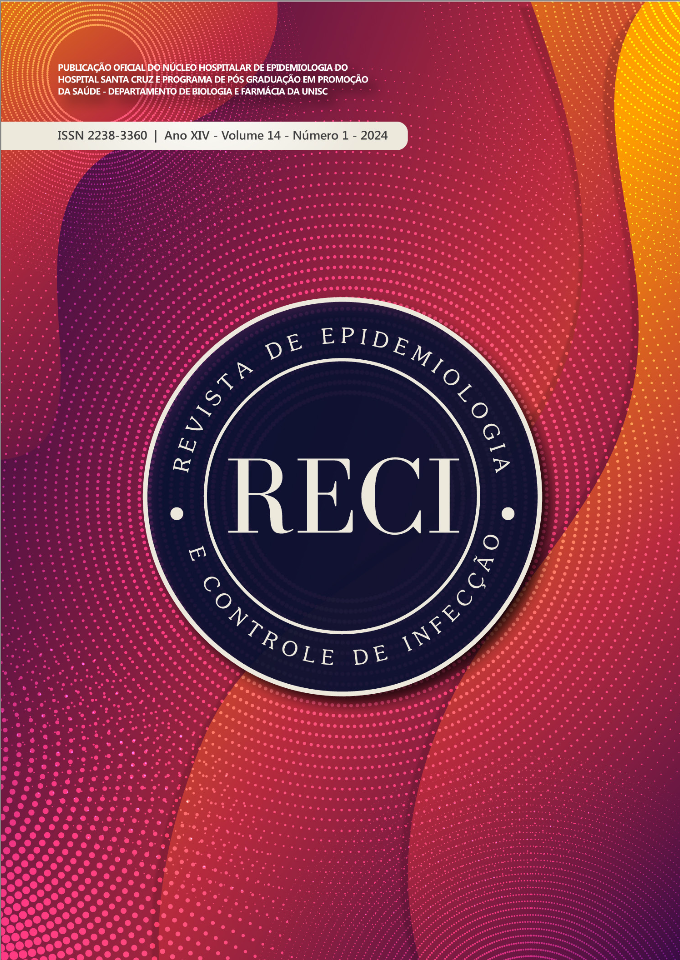Infección neonatal por SARS-CoV-2 adquirida en la comunidad: reporte de caso
DOI:
https://doi.org/10.17058/reci.v14i1.18919Palabras clave:
Covid-19, SARS-CoV-2, Cuidados Intensivos Neonatales, Reporte de un casoResumen
Justificación y Objetivos: La recolección de datos sobre los contagios por covid-19 en recién nacidos (RN) no es tan frecuente como en adultos. En este contexto, y debido al bajo número de infecciones neonatales por SARS-CoV-2 descritas, en este estudio se describe un caso clínico de infección posnatal por covid-19 en un recién nacido en la comunidad. Métodos: Se recogieron características médicas de las historias clínicas desde abril de 2021 hasta el último resultado del RN en mayo de 2021. Resultados: Este artículo reporta el caso de un RN del sexo masculino, a término de 38 semanas. Al 17.º día de vida, el RN ingresó a la unidad de pediatría con fiebre e ictericia zona 4, leve retracción torácica inferior y taquipnea. La madre dio positivo para covid-19. En el RN se detectó sepsis neonatal tardía con foco pulmonar. Lo hospitalizaron, y la prueba de antígenos para covid-19 dio como resultado positivo. El estado del RN empeoró rápidamente, lo remitieron a la unidad de cuidados intensivos neonatales (UCIN), donde requirió intubación y ventilación mecánica controlada por presión. En la segunda semana en la UCIN, desarrolló hipertensión pulmonar grave con disminución de la saturación periférica de oxígeno y taquicardia. El RN requirió transfusión sanguínea, y lo pusieron en posición prona por períodos. El paciente no soportó las reducciones en los parámetros del ventilador mecánico y presentó una hipoxemia progresiva. El RN falleció un mes y tres días después de la hospitalización. Conclusión: Los hallazgos muestran un caso del covid-19 adquirido en la comunidad que progresó a la forma grave de la enfermedad.
Descargas
Citas
Raschetti R, Vivanti AJ, Vauloup-Fellous C, et al. Synthesis and systematic review of reported neonatal SARS-CoV-2 infections. Nature Communications 2020;11(1):1–10; doi: 10.1038/s41467-020-18982-9.
Hamid S, Woodworth K, Pham H, et al. COVID-19-associated hospitalizations among U.S. infants aged. MMWR Morb Mortal Wkly Rep 2022;71(45):1442–1448; doi: 10.15585/MMWR.MM7145A3.
Calvo C, Tagarro A, Méndez Echevarría A, et al. COVID-19 pandemic. What have we learned? Anales de Pediatría (English Edition). 2021 Nov;95(5):382.e1–8. doi: 10.1016/j.anpede.2021.10.002.
Rodwell RL, Leslie AL, Tudehope DI. Early diagnosis of neonatal sepsis using a hematologic scoring system. J Pediatr. 1988 May;112(5):761-7. doi: 10.1016/s0022-3476(88)80699-1. PMID: 3361389.
Zeng LK, Tao XW, Yuan WH, et al. First case of neonate infected with novel coronavirus pneumonia in China. Chinese Journal of Pediatrics. 2020;58(0):E009.doi: 10.3760/cma.j.issn.0578-1310.2020.0009.
dos Santos Beozzo GPN, de Carvalho WB, Krebs VLJ, et al. Neonatal manifestations in COVID-19 patients at a Brazilian tertiary center. Clinics. 020;75:e2407. https://doi.org/10.6061/clinics/2020/e2407
Wang S, Guo L, Chen L, et al. A case report of neonatal 2019 coronavirus disease in china. clinical infectious diseases. 2020; 71(15):853-857. doi: 10.1093/cid/ciaa225.
Dhir SK, Kumar J, Meena J, et al. Clinical features and outcome of sars-cov-2 infection in neonates: a systematic review. Journal of Tropical Pediatrics. 2021; 67(3):fmaa059. doi: 10.1093/tropej/fma
Raschetti R, Vivanti AJ, Vauloup-Fellous C, et al. Synthesis and systematic review of reported neonatal SARS-CoV-2 infections. Nat Commun. 2020;11:5164. doi: 10.1038/s41467-020-18982-9.
##submission.downloads##
Publicado
Cómo citar
Número
Sección
Licencia
Derechos de autor 2024 Kamila Mohammad Kamal Mansour, Bruna Eduarda Diehl, Fabiana Mello, Daniela Miranda Uroda, Rafik Ali Juma Hamid, Éboni Marília Reuter, Dulciane Nunes Paiva

Esta obra está bajo una licencia internacional Creative Commons Atribución 4.0.
The author must state that the paper is original (has not been published previously), not infringing any copyright or other ownership right involving third parties. Once the paper is submitted, the Journal reserves the right to make normative changes, such as spelling and grammar, in order to maintain the language standard, but respecting the author’s style. The published papers become ownership of RECI, considering that all the opinions expressed by the authors are their responsibility. Because we are an open access journal, we allow free use of articles in educational and scientific applications provided the source is cited under the Creative Commons CC-BY license.


